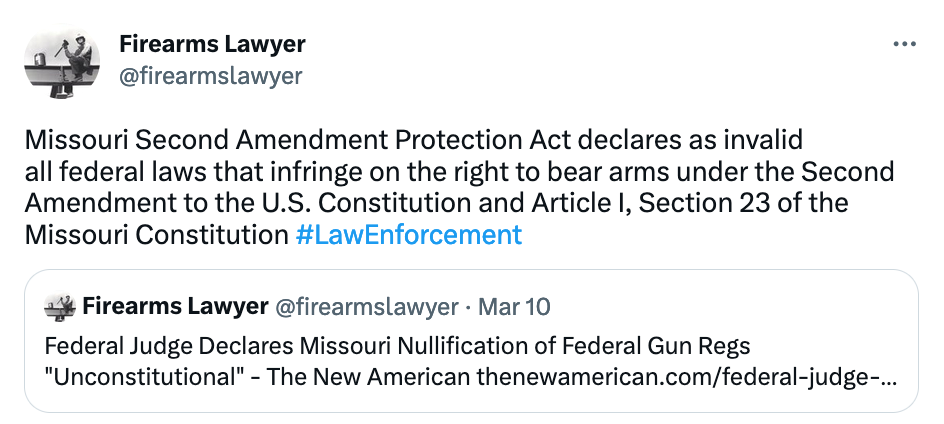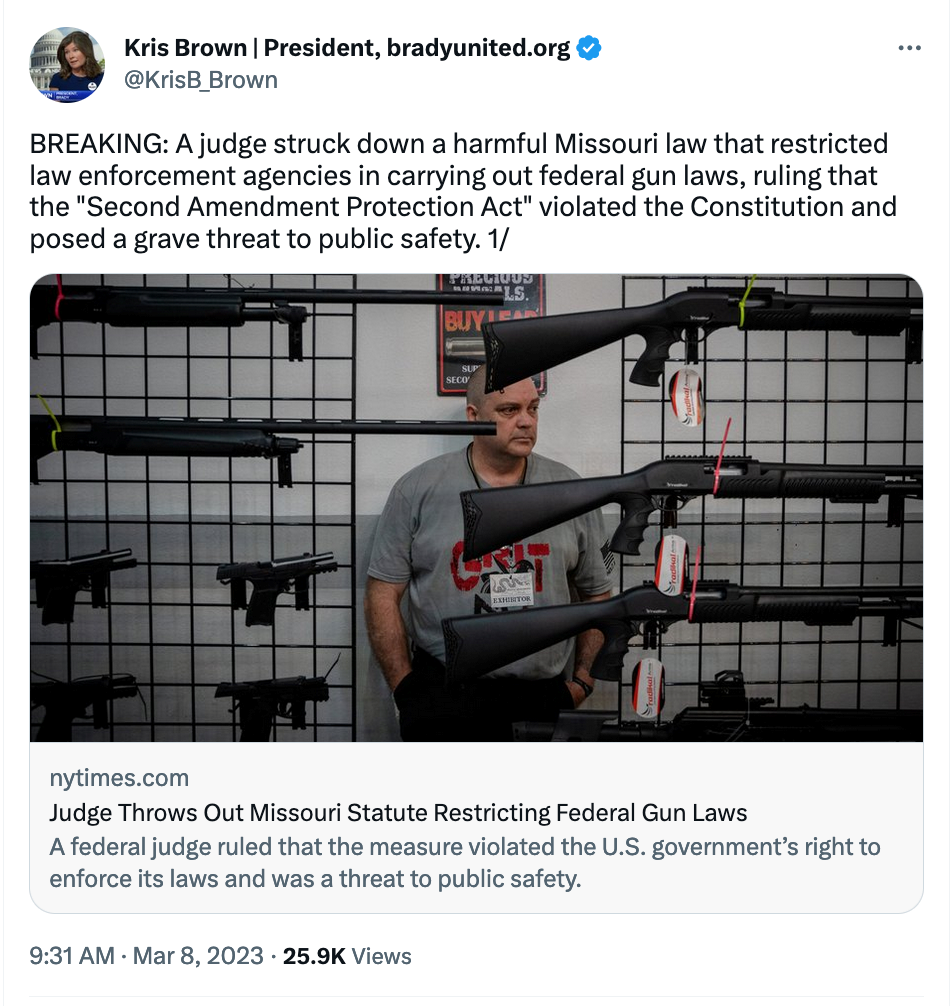
By Steve Pomper

Gov. Mike Parson, former Polk County sheriff and U.S. Army MP
My basic understanding, if somewhat simplified, of the federal-state balance regarding the U.S. Constitution’s supremacy clause is states can pass laws to provide more but not less protection than the federal Constitution provides, including the unalienable right to life and to defend that life.
As explained by Thoughtco, “In order to prevent the states from claiming too much power, the Constitution’s Supremacy Clause (Article VI, Clause 2) holds that all laws enacted by the state governments must comply with the Constitution, and that whenever a law enacted by a state conflicts with a federal law [that adheres to the Constitution], the federal law must be applied.”
The Supremacy Clause says federal law is supreme over state law when they are in conflict. However, you’ll notice the first requirement is that state law “comply with the Constitution.” Same goes for federal laws. So, the implication is federal law is supreme over state law, but only if the federal law complies with the Constitution.

Second Amendment to the U.S. Constitution
Since this discussion is about the Second Amendment’s self-defense rights specifically, states can provide greater protections for self-defense/gun rights, not fewer. For example, the Washington State Constitution provides citizens with what could be viewed as a greater right by using even clearer language than in the U.S. Constitution’s Second Amendment.
The Constitution of the United States
Second Amendment; Bill of Rights:
“A well regulated Militia, being necessary to the security of a free State, the right of the people to keep and bear Arms, shall not be infringed.”
Pretty clear.
The Washington State Constitution
The Right to Bear Arms:
“The right of the individual citizen to bear arms in defense of himself, or the state, shall not be impaired.”
Even clearer.
But to anti-self-defense/gun radicals who will do anything to deny the obvious letter and intent of the Second Amendment, they make federal and state self-defense/gun rights intentionally murky. And with the radicals’ efforts to muck with Americans’ fundamental rights, cops must contend with confusing and contradictory laws.
Cops swear oaths to uphold the federal and their state constitutions. So, what happens when a state or federal government passes laws that infringe on the Second Amendment or state constitutional self-defense/gun rights?
The police can become mired in a legal, ethical, and moral no man’s land that can be difficult, if not impossible, to slog through.
So, because the current federal government and several states intend to infringe on Americans’ God-given self-defense/gun rights, some pro-self-defense states have felt compelled to pass their own (which should be unnecessary) pro-self-defense laws to protect the Second Amendment and their state constitutional self-defense protections.
But what happens when federal judges further muddy the waters by blocking a state from providing their citizens with more liberty (or at least the same 2A liberty) regarding self-defense? According to The Epoch Times, this is happening in Missouri.

Polk County Sheriff Mike Parson (1993-2005)
Fortunately, Missouri Gov. Mike Parson is a former sheriff and U.S. Army MP. He’s very familiar with what self-defense/gun rights mean to his state’s citizens.
In response to the federal attacks on Americans’ self-defense rights, Missouri passed the “Second Amendment Preservation Act (SAPA).” Frustrated state Republican officials felt they had to do something extreme to battle the fed’s extreme actions to reduce or eliminate Missourians’ self-defense rights.
Signed into law by Missouri Gov. Mike Parson in June 2021, the law declares invalid all federal laws infringing on the right to bear arms under the Second Amendment to the U.S. Constitution and Missouri Constitution.”
The act defined infringements as ‘certain taxes, certain registration and tracking laws, certain prohibitions on the possession, ownership, use, or transfer of a specific type of firearm, and confiscation orders.’
The act declared ‘that federal supremacy does not apply to federal laws that restrict or prohibit the manufacture, ownership, and use of firearms, firearm accessories, or ammunition within the state because such laws exceed the scope of the federal government’s authority.’
It further imposed the duty of protecting the rights of ‘law-abiding citizens to keep and bear arms’ in the hands of courts and law enforcement agencies in the state.
This dichotomy puts cops under pressure to either enforce federal law that seems to infringe on a constitutional right or to enforce a state law that contradicts that federal law. This contradiction is unfair to American gun owners and certainly to America’s law enforcement officers. Consistency used to be a hallmark of American justice.

Also, according to The Times, “The DOJ alleged the [SAPA] law was undermining federal drug and weapons investigators by placing heavy fines of up to $50,000 on police departments if they ‘infringed’ on Missourians’ Second Amendment rights by following any federal laws.”
Part of the problem seems obvious. The intent of Missouri’s law, to keep state and local cops from enforcing what they see as unconstitutional federal laws, is noble and wouldn’t be necessary for a country where everyone respected the Constitution and its processes for change.
However, it seems an unintended consequence could be a possible tit-for-tat political battle that could follow between leftists and conservatives and a proliferation of competing state and federal laws. It places law enforcement agencies and their cops in challenging positions while these dueling laws battle in the courts.
When considering these conflicting laws, cops are more likely to support upholding the Constitution rather than supporting ways to circumvent, infringe, or subvert the law of the land that they’ve sworn oaths to support and defend. Unlike some politicians, cops take their oaths seriously.

To be fair, some don’t think much of self-defense rights.
Though I recoil at Obama-appointed U.S. District Court Judge Brian Wimes’ nullification of SAPA, ruling it “invalid, null, void and of no effect,” as ugly as it is, that is the current ruling under our legal system. But the right to appeal the decision is also current under this system, which Missouri plans to do.

Brian Wimes, United States District Court
for the Western District of Missouri
Missouri AG Andrew Bailey, a Republican, tweeted, “As Attorney General, I will protect the Constitution, which includes defending Missourians’ fundamental right to bear arms. We are prepared to defend this statute to the highest court, and we anticipate a better result at the Eighth Circuit.”
Bailey continued. “The Second Amendment is what makes the rest of the amendments possible.
If the state legislature wants to expand upon the foundational rights codified in the Second Amendment, they have the authority to do that.”
As mentioned up top: the state wants “to expand” rights, not contract them.
And further, “But SAPA is also about the Tenth Amendment. It’s about federalism and individual liberty, so we will be appealing the court’s ruling.”
Amen!